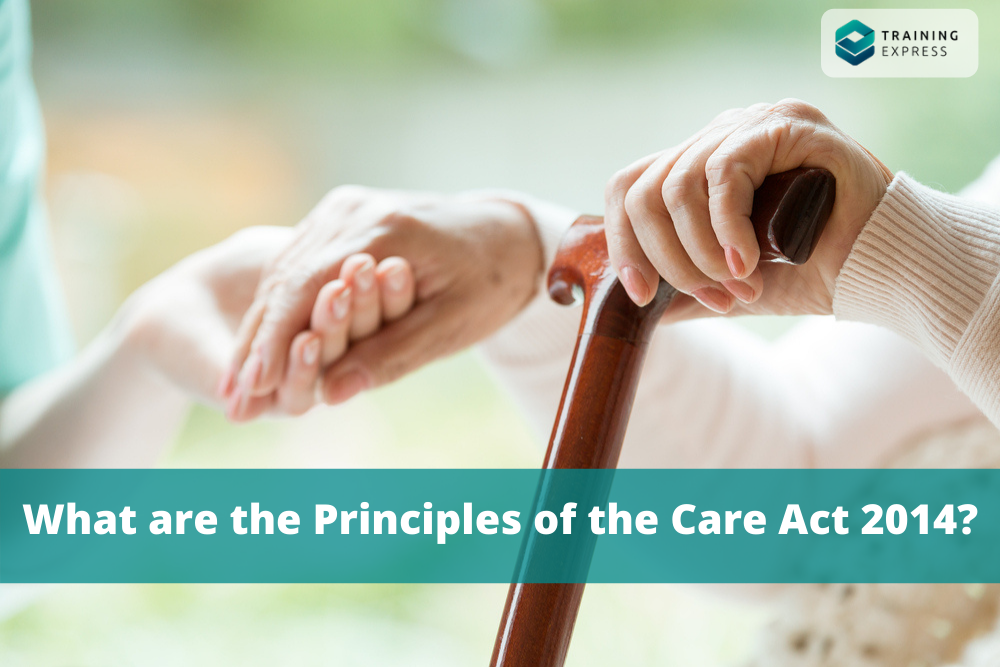

Learning about the principles of the Care Act 2014 will enable you to protect the people you care for. Your knowledge about this can save a vulnerable person from neglect and abuse. The Care Act 2014 is governed with six principles to safeguard vulnerable adults from harm. It is pivotal for caregivers to know these principles to protect adults and improve their quality of life. They also facilitate well-being and independence in adults in danger of abuse and neglect. Here you can find answers to the following questions and more.
- What is the Care Act 2014?
- Why do we need The Care Act 2014?
- What are the principles of the Care Act 2014?
- Why should we follow the principles of the Care Act 2014?
Table of Contents
What is the Care Act 2014?
The Care Act 2014 is an Act, written by the Government of the United Kingdom. It was created as a provision to improve the law relating to care and support for adults. This law represents the most significant reform of care and support. It puts people and their carers in control of their care and support. The Care Act 2014 contains the following rules –
- Laws relating support for carers
- Provision about safeguarding adults from any kind of abuse or neglect
- Provision about care standards
- Making provision about Health Education in England and establish them
- Making provision about the Health Research Authority and establish them
- Provision about incorporating care and support with health services
- And provision for connected purposes.
The Care Act 2014 is mainly about people who are 18 and over and need care and support. The Care Act 2014 was formed for parents and young people as well as local authorities and councils.
Why do we need The Care Act 2014?
Previously, there were a lot of different laws on care and support in England. So it was difficult to know what care and support one could get. The 2014 Care Act brings them all together under one new law. It discusses what type of care people should get. Besides, it also gives guidance and information for authorities on how to use the Care Act properly. Therefore, it gives clear and simple rules and advice on care and support for adults.
This Act helps to improve people’s independence and wellbeing. It aims to protect vulnerable adults from any kind of mistreatment. This Act gives people who need support, more control over what happens. Consequently, improving their quality of life by keeping them safe and protected.
What are the principles of the Care Act 2014?
Six principles govern The Care Act 2014 to safeguard adults. The Department of Health first introduced these six principles in 2011. These six principles embedded in the Care Act apply to all health and care settings. Caregivers should follow the principles of the Care Act 2014. To ensure proper implementation of the law and for safeguarding adults.
The six principles of the Care Act 2014 are given below –
1. Empowerment
2. Protection
3. Prevention
4. Proportionality
5. Partnership
6. Accountability
The principles of the Care Act 2014 promotes a person-centred care approach. This approach encourages caregivers to tailor their care to the needs of the person they are caring for. These principles are explained below in detail. That will provide a better picture of how they ensure the well-being of vulnerable people.
1. Empowerment
Empowerment refers to the degree of self-reliance and autonomy in people. This enables them to express their interests in a responsible and self-determined way. It allows them to act on their own authority. It’s a process that helps people become stronger and more confident.

The principle of empowerment refers to the process of self-empowerment in vulnerable adults. Which, in turn, enables them to get over their sense of inefficacy or helplessness. Besides, it helps them to recognise and use their abilities.
This principle says that we should encourage vulnerable adults to make their own decisions. They get support for their choices, and it’s a process of overall informed consent. For example, vulnerable adults need enough information so that they can make informed decisions about their care. Regardless of their needs, we must provide them with enough information and advice. Communication of information should be clear so that people can understand it easily.
Even when reporting a suspected safeguarding issue to the local authority or police, you will need consent from the adult as per this principle.
How to ensure the implementation of the empowerment principle?
Ensuring empowerment in adults is necessary for their wellbeing. For proper implementation of this principle, vulnerable adults need the following –
- They need to feel involved.
- They need visible support.
- Furthermore, we must encourage them to make their own decisions.
To effectively empower vulnerable adults, we must assess what they need to make decisions confidently. Also, we should provide them with information clearly in a straightforward way. And ask them questions relating to changes in their safeguarding or care plan. No matter how small or trivial their care is, they have a right to feel included.
2. Protection
The principle of protection refers to the support and representation required by adults in need. The Care Act 2014 promotes the wellbeing of adults. Hence, it is vital to ensure their protection at all costs.

The Act clearly states how people can raise concerns about the safety or wellbeing of someone who has care needs. If a person is at risk of abuse or neglect, authorities must act immediately. An effective response must be in place to protect the person in need.
Protection or safeguarding is available every one despite their eligibility. For example, if there is a reasonable cause to think that a person is –
- experiencing abuse or neglect
- at the risk of abuse or neglect
Then a local authority must carry out necessary enquiries to facilitate protection.
How to protect those in need?
Firstly, we must know how to recognise the signs of abuse or neglect. Secondly, we should know when and how to contact the appropriate authorities to provide protection. It is also necessary to follow suitable safeguarding procedures, so the situation is under control as soon as possible. While providing protection, you must make sure not to worsen the existing risks. In short, one should respond immediately and take action to help a vulnerable person in a critical situation.
3. Prevention
Prevention is one of the most pivotal principles of care. The prevention principle focuses on the belief that it is better to take action before someone is hurt. Abuse and neglect have long-lasting effects on a person, regardless of their age. Even after being free from abuse and living in a safe place, they might face mental or physical harm.

No one should have to be in the situation shown in the picture above. This principle of prevention is intended to prevent such a situation.
The local authority is primarily liable for prevention in their area. Their duties apply to all adults, including the following –
- People who don’t have any current needs for care and support
- Adults with needs for care and support
- Carers
How to implement the principle of prevention?
To ensure successful enforcement of the prevention principle, you must be proactive. It’s necessary to stop safeguarding concerns from evolving in the first place. Another way of prevention is raising awareness about abuse and neglect.
Safeguarding training is an excellent way to promote prevention. It informs caregivers about the signs of abuse and gives them the confidence to report wary matters. And that so without putting the vulnerable adult at any more risk. We recommend the following training courses for safeguarding vulnerable adults –
4. Proportionality
The principle of proportionality refers to the least intrusive response for the risk presented. Following this principle means ensuring proper utilisation of preventative measures. Also, responding to a safeguarding issue in the most subtle way possible. It involves taking into account the needs of the vulnerable person. This ensures that any decision takes the vulnerable adult into account when dealing with abuse or neglect. Furthermore, consider all risks and address them beforehand so that no further harm is done.
Ensuring proportionality requires taking small yet effective steps to handle an issue. For example, trying to address a severe problem at once can be intense. It may end up putting the adult at more risk. On the other hand, someone in a serious situation might need drastic steps to feel heard. If the actions taken are not proportionate, they might feel ignored, not heard or believed.
How to ensure proportionality?
To make the safeguarding process proportional, the adult should be involved in decision-making. It is essential to take their wishes and feelings into account. They know what actions would impact their life more and therefore, what is best for them.
Another thing to ensure proportionality is that the action taken should be relative to the risk involved. It is also essential to only get involved when needed. Unnecessary intervention might put the adult at more risk.
5. Partnership
The Partnership principle states that organisations should work with other local communities. Local people and authorities also have a part to play in preventing and protecting others from abuse. Authorities can partner with local services and communities to help prevent neglect and abuse. It will make detection, and reporting easier while the chances of an adult getting help go higher. Because when multiple authorities recognise a safeguarding issue and submit a report, authorities can react quickly and with confidence. Many services offer local solutions by working closely with their communities. Communities should come together to prevent, detect and report neglect and abuse. Because they are more in contact with the adults, and they can detect the warning signs better. Relevant parties and other people can look after personal information and only share it when keeping vulnerable adults safe. It is crucial to protect personal and sensitive information about people. Compliance with the Data Protection Act is of utter importance in this case.
6. Accountability
The principle of accountability ensures transparency in safeguarding. The people responsible for safeguarding vulnerable adults must be accountable. Everyone involved must know their safeguarding duties. They should know what signs to look for and how to get help for adults in need. They must be wholly transparent about all the safety practices to support vulnerable people.
Furthermore, they should take responsibility for their actions in the care and support of adults. Because safeguarding is everyone’s business. The principle of accountability makes sure that everyone plays their part when it comes to protecting unsafe adults. Everyone is accountable for their actions as individuals, services and organisations.
If you believe an adult is at risk and gives you consent to disclose, you must report it to the authority. Also, you must hold any evidence and ensure the vulnerable adult’s safety. Also, communicate clearly with support channels like local services that work together with you and local authorities.
Why should we follow the principles of the Care Act 2014?
The principles of the Care Act promotes the wellbeing of vulnerable adults. Abused or neglected adults often stay silent during any kind of safeguarding concerns. This usually means that caregivers make all the decisions while the vulnerable adult has little to no involvement.
The Care Act 2014 principles aim to get rid of such an isolated approach. By following the six principles, we can ensure the wellbeing of the people in need and put their needs first. It also achieves the following –
- Vulnerable adults are empowered to take an active part in safeguarding processes.
- Adults get to receive the most appropriate care and feel in control.
- Everyone is treated like a human being with need and wants.
- Increased autonomy of vulnerable adults.
- Increased commitment to deliver the best possible care to people in need.

The Care Act 2014 promotes caregivers to take a person-centred approach when they are protecting any vulnerable adults. When you choose to follow the principles, you place the vulnerable person’s wellbeing and needs first. This way, you help the vulnerable person by giving them power while providing needed care. Following the six principles of the Care Act 2014 enhances the wellbeing and improve quality of life.
Closing Notes
Principles of the Care Act 2014 are planted in the heart of care and support of vulnerable adults. To do your part in safeguarding people at risk of abuse and neglect, learn more about safeguarding adults. Check out these courses to ensure the safety and wellbeing of adults in need.
- Available Courses
- Animal care10
- Design36
- Training10
- Accounting & Finance Primary52
- Teaching & Academics Primary37
- Teaching23
- Quality Licence Scheme Endorsed181
- Law10
- IT & Software238
- Job Ready Programme52
- Charity & Non-Profit Courses28
- HR & Leadership4
- Administration & Office Skills6
- Mandatory Training36
- Regulated Courses4
- AI & Data Literacy29
- Health and Social Care291
- Personal Development1668
- Food Hygiene119
- Safeguarding81
- Employability288
- First Aid73
- Business Skills301
- Management426
- Child Psychology41
- Health and Safety539
- Hospitality28
- Electronics30
- Construction63
- Career Bundles201
- Marketing39
- Healthcare174
 Food Hygiene
Food Hygiene Health & Safety
Health & Safety Safeguarding
Safeguarding First Aid
First Aid Business Skills
Business Skills Personal Development
Personal Development





